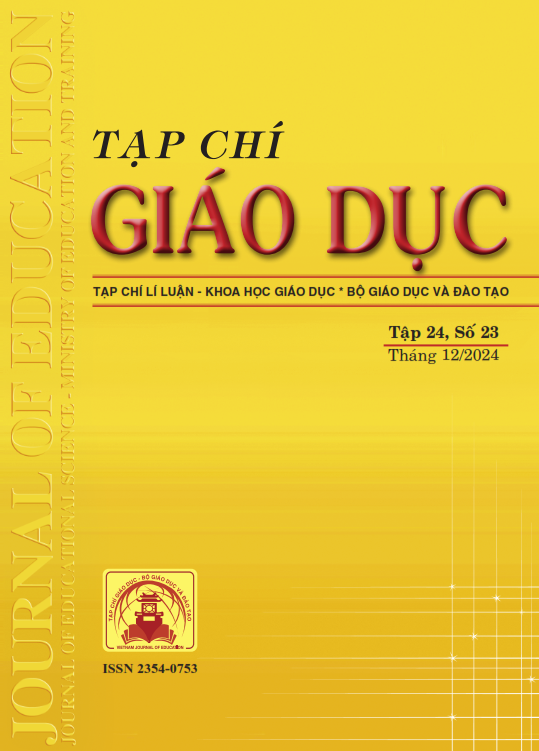Một số chiến lược quản lí nhằm thúc đẩy văn hóa học tập chuyên nghiệp cho giáo viên: Phân tích và khuyến nghị
Tóm tắt
Professional Learning Culture (PLC) is critical in improving the quality of teaching and developing the professional capacity of teachers. To promote a PLC for teachers, management strategies are essential to engage teachers, contributing to creating a sustainable learning environment and supporting long-term professional development. The article analyzes some management strategies to promote a PLC, including: building a common vision and mission, facilitating collaborative learning, encouraging participation in the decision-making process, building continuous feedback mechanisms, and evaluating and flexibly adjusting management strategies. These strategies are evaluated through empirical studies to propose implications for flexible application in different educational contexts. Applying these management strategies effectively will bring about significant improvements in building a PLC and improving the quality of teaching at educational institutions.
Tài liệu tham khảo
Blumen, H. M., & Stern, Y. (2011). Short-term and long-term collaboration benefits on individual recall in younger and older adults. Memory and Cognition, 39(1), 147-154. https://doi.org/10.3758/s13421-010-0023-6
Bryson, J. M. (2011). Strategic planning for public and nonprofit organizations: A guide to strengthening and sustaining organizational achievement (4th ed.). Jossey-Bass.
Buchs, C., Butera, F., Mugny, G., & Darnon, C. (2004). Conflict Elaboration and Cognitive Outcomes. Theory into Practice, 43(1), 23-30. https://doi.org/10.1207/s15430421tip4301_4.
Campbell, A., & Yeung, S. (1991). Creating a sense of mission. Long Range Planning, 24(4), 10-20. https://doi.org/10.1016/0024-6301(91)90002-6
Cardona, P., & Rey, C. (2006). Management by missions: How to make the mission a part of management. Problems and Perspectives in Management, 4(1), 164-174.
De Clercq, D., Sun, W., & Belausteguigoitia, I. (2021). When is job control most useful for idea championing? Role conflict and psychological contract violation effects. Journal of Management and Organization, 27(2), 382-396. https://doi.org/10.1017/jmo.2018.28
Deal, T. E., & Peterson, K. D. (2009). Shaping School Culture: Pitfall, Paradoxes, and Promises. Strategies (p. 278). http://www.wiley.com/WileyCDA/WileyTitle/productCd-0787996793.html
DuFour, R. (2004). What is a “professional learning community”? Educational Leadership, 61(8), 6-11.
Elmore, R. F. (2004). School reform from the inside out: Policy, practice, and performance. Harvard Education Press. 8 Story Street First Floor, Cambridge, MA 02138.
Galvin, P., & Arndt, F. (2014). Strategic management: Building depth as well as breadth. Journal of Management and Organization. Cambridge University Press. https://doi.org/10.1017/jmo.2014.35
Green, K. W. Jr, & Medlin, B. (2003). The strategic planning process: The link between mission statement and organizational performance. Academy of Strategic Management Journal, 2(1), 23-32.
Harris, A., & Jones, M. (2010). Professional learning communities and system improvement. Improving Schools, 13(2), 172-181. https://doi.org/10.1177/1365480210376487
Harris, A., & Jones, M. (2019). Leading professional learning with impact. School Leadership & Management, 39(1), 1-4. https://doi.org/10.1080/13632434.2018.1530892
Harris, D., Martinez, J. I., & Ward, J. L. (1994). Is Strategy Different for the Family-Owned Business? Family Business Review, 7(2), 159-174. https://doi.org/10.1111/j.1741-6248.1994.00159.x
Hattie, J., & Timperley, H. (2007). The power of feedback. Review of Educational Research. SAGE Publications Inc. https://doi.org/10.3102/003465430298487
Hord, S. (2004). Professional learning communities: An overview. Learning together, leading together: Changing schools through professional learning communities. Teachers College Press.
Johnson, D. W., & Johnson, R. T. (2009). An educational psychology success story: Social interdependence theory and cooperative learning. Educational Researcher, 38(5), 365-379. https://doi.org/10.3102/0013189X09339057
Leithwood, K., Harris, A., & Hopkins, D. (2020). Seven strong claims about successful school leadership revisited. School Leadership and Management, 40(1), 5-22. https://doi.org/10.1080/13632434.2019.1596077
Leithwood, K., Sun, J., & Pollock, K. (Eds.). (2017). How school leaders contribute to student success: The four paths framework (Vol. 23). Springer.
Lipnevich, A. A., & Smith, J. K. (Eds.). (2018). The Cambridge handbook of instructional feedback. Cambridge University Press.
Lipnevich, A. A., McCallen, L. N., Miles, K. P., & Smith, J. K. (2014). Mind the gap! Students’ use of exemplars and detailed rubrics as formative assessment. Instructional Science, 42(4), 539-559. https://doi.org/10.1007/s11251-013-9299-9
McArdle, K., Briggs, S., Forrester, K., Garrett, E., & McKay, C. (2021). Collaborative and Participatory Approaches. In The Impact of Community Work (pp. 163-178). Cambridge University Press. https://doi.org/10.46692/ 9781447343950.012.
Mintzberg, H. (1994). The rise and fall of strategic planning: Reconceiving roles for planning, plans, planners. Free Press.
Price, D., Smith, J. K., & Berg, D. A. G. (2017). Personalised feedback and annotated exemplars in the writing classroom: An experimental study in situ. Assessment Matters, 11, 122-144. https://doi.org/10.18296/am.0027
Robinson, V. (2011). Student-centered leadership (Vol. 15). John Wiley & Sons.
Schein, E. H. (2010). Organizational culture and leadership (Vol. 2). John Wiley & Sons.
Shute, V. J. (2008). Focus on formative feedback. Review of Educational Research, 78(1), 153-189. https://doi.org/ 10.3102/0034654307313795
Spillane, J. P. (2005). Distributed leadership. The Educational Forum, 69(2), 143-150. Taylor & Francis Group.
Stoll, L., Bolam, R., McMahon, A., Wallace, M., & Thomas, S. (2006). Professional Learning Communities: A Review of the Literature. Journal of Educational Change, 7(4), 221-258. https://doi.org/10.1007/s10833-006-0001-8
VIEF - Vietnam Innovative Educator Foundation (2015). Cộng đồng Giáo viên sáng tạo Việt Nam: Microsoft Innovative Educator. https://vief.edu.vn
Walker, A. (2019). The impact of shared decision-making on school effectiveness: A longitudinal study. Journal of Educational Change, 20(1), 25-44.
Tải xuống
Đã Xuất bản
Cách trích dẫn
Số
Chuyên mục
Giấy phép

Tác phẩm này được cấp phép theo Ghi nhận tác giả của Creative Commons Giấy phép quốc tế 4.0 .












